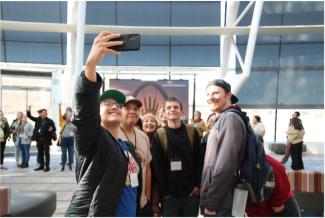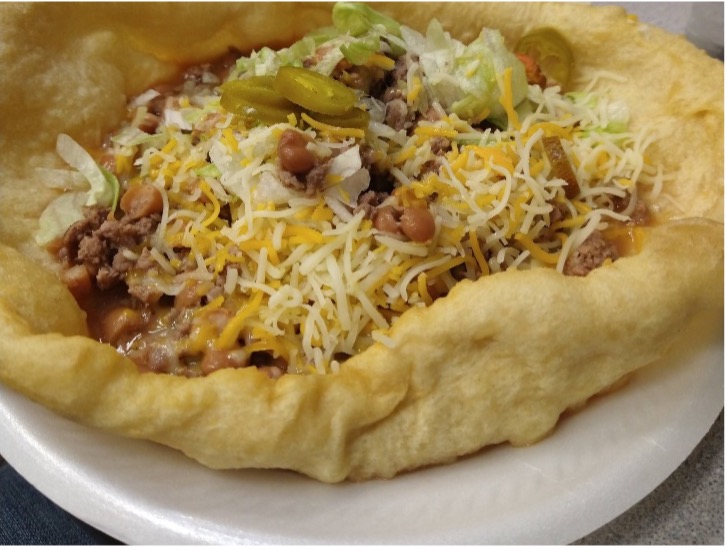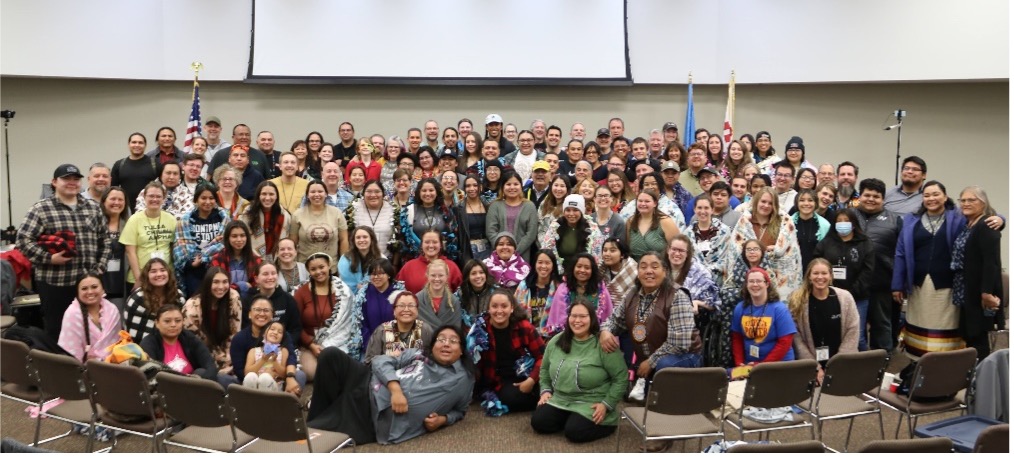Would Jesus Eat Frybread? Can I?

I sat off to the side of the small stage, listening as the conference speaker wept, as people around the room wept. Wept and prayed. There was just so much pain.
…
You don’t belong here. You shouldn’t even be in the room, the thoughts barged into my mind.
Questions
Months earlier, when one of my good friends invited me to volunteer at the 2022 Would Jesus Eat Frybread? Conference (WJEF?) in Oklahoma, I had lots of questions. What would I do there? I’m not Native myself. … But after prayer, I decided, a little nervously, to say yes.
As I landed in Oklahoma City and prepped for the conference, doing everything from tagging along with staff as they stocked up on conference goodies at Sam’s Club to (trying) to help set up livestreaming for the event, the questions remained.
Frybread
Ultimately, my questions had a lot of connections to the main question of the conference itself: Would Jesus eat frybread?
For context, frybread is about the size of a tortilla but probably four times as thick. It’s equal parts flour, flavor, and all-around amazingness! But it has a complicated origin story. When Native peoples were forced to move from Arizona to New Mexico, part of the rations they were given became the ingredients for frybread. It’s simultaneously a painful reminder of past hurts and an emblem of Native culture and resilience.

So the question “Would Jesus eat frybread?” is really asking “Would Jesus be willing to step into the complicated story of Native people?” Does he care, does he see the pain, does he see the strength there? Is it okay to be Christian and Native?
Historically, the answer that’s been far too often perceived and communicated has been no. In the heaviest moments of the conference, we lamented these things. As story after story was shared about the traumas of missionary boarding schools. As we heard how the good news of the gospel, meant to be a source of healing and life, was so often misshapen and twisted into something else when shared with Native people.
Something I’d been carrying for many years surfaced in my heart: As I grew up and went off to college, I’d been confronted by just how many awful things had been done by people who looked like me. And though I hadn’t done them myself — and my immediate family hadn’t either — somehow I couldn’t shake the feeling that I represented these past sins. Sitting there right next to the stage at WJEF?, I couldn’t help feeling like I was a symbol for the source of so much pain that Native people have experienced.
Even as Native students and staff were asking “Would Jesus eat frybread?” I realized I was asking “Should I, as a White man, I be allowed to eat frybread?”
YES!
Up to this point, my description of WJEF? may make it sound like it was two and a half days of only lamenting and pain. It wasn’t. It was full of laughter and warmth, beauty and welcome. From the steady string of jokes from our emcees to an amazing seven-on-seven basketball game to culture night where people sang and danced and shared stories, it was an incredible time. Our main speaker, Terry Wildman, brought messages of hope and healing from Isaiah 60. We heard testimonies of how Creator Sets Free (Jesus) had called many Native people to himself. Students and staff received copies of the First Nations Version (FNV) of the New Testament.

All these experiences together combined to answer the question “Would Jesus eat frybread?” with an emphatic yes! Yes, Jesus does want to enter the story of all Native people and bring healing. Through the hard work of Terry and scores of other people over five years, Jesus has even provided a version of his Word that captures the simplicity, clarity, and beauty of Native storytellers in English while remaining faithful to the original language of the Bible!
Even as I heard these stories of forgiveness and people being set free from past sins and struggles, even as I experienced the warmth and hospitality of everyone around me, I felt like Jesus spoke to me too about my question: You do not need to carry this shame and guilt anymore. You are free too.
It was beautiful, it was powerful, and it was healing. I enthusiastically joined in on our feast of frybread and buffalo stew (and helped myself to some leftover frybread as the conference was winding down!). Getting to take communion at the end of the conference with Native students and staff, as a symbol of the bond between us in our love and pursuit of Creator Sets Free, was a moment I will deeply cherish.
The Great Spirit loves this world of human beings so deeply he gave us his Son — the only Son who fully represents him. All who trust in him and his way will not come to a bad end, but will have the life of the world to come that never fades — full of beauty and harmony. Creator did not send his Son to decide against the people of this world, but to set them free from the worthless ways of the world.
— John 3:16-17 (FNV)







